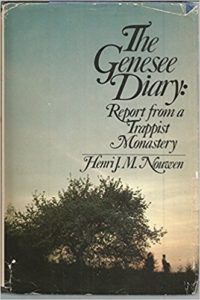
As often occurs, I read this book at the request of a friend I admire who would like to discuss it. This particular individual touts the diary of a catholic priest’s 7 month monastic sabbatical as her favorite book of all time. While I am not quite so captured, I did find myself embracing this work at a deeper level as I journeyed through the months. I chose my words in that last sentence carefully. It’s not that I ‘liked’ the book more as I read on; it’s more like a sense of self-reflection began to occur as the days and various thoughts were contemplated.
Worry/Anxiety:
When God is my only concern, when God is the center of my interest, when all my prayers, my reading, my studying, my speaking, and writing serve only to know God better and to make him known better, then there is no basis for anxiety or stage fright.
Beauty/Loneliness:
On this earth the experience of great beauty always remains mysteriously linked with the experience of great loneliness.
Prayer Inhibiting Prayer:
While it is true that in order to pray you have to empty your heart and mind for God, you also have to empty your heart and mind of your feelings and ideas on prayer. Otherwise, prayer gets in the way of praying… Simply saying, “Lord Jesus Christ, have mercy on me” a hundred times, a thousand times, ten thousand times… might slowly clean my mind and give God a little chance.
Joy/Pain:
The experience of God’s presence is not void of pain. But the pain is so deep that you do not want to miss it since it is in this pain that the joy of God’s presence can be tasted. This seems close to nonsense except in the sense that it is beyond sense and, therefore, hard to capture within the limits of human understanding. The experience of God’s unifying presence is an experience in which the distinction between joy and pain seems to be transcended and in which the beginning of a new life is intimated.
Suffering:
There are some forms of suffering that a man must accept with love and bear in silence. There are other agonies to which he must say no. – A. Heschel
Authority of Jesus:
The authority of Christ is an authority based on humility and obedience and received by experiencing the human condition in a deeper, broader, and wider way than any person ever did or ever will do.
Humility and Obedience:
The hard reality is that in our world humility and obedience are never totally separated from power and manipulation. We are challenged to see the will of God in people who are sinful like ourselves and always subject to using their authority more for the worldly kingdom, even when called Church, than for the kingdom of Christ. But Jesus allowed the will of his Father to be done through Pilate, Herod, mocking soldiers, and a gaping crowd that did not understand. How little is asked of me…
But let me at least realize today that if I ever am asked to accept or exercise authority over others, it should be an authority based on a sharing in the suffering of those whom I ask to obey.
Loneliness/Joy:
If I am able to remember loneliness during joy, I might be able in the future to remember joy during loneliness and so be stronger to face it and help others face it.
A few other quotes that I underlined during this reading:
- I spoke more about God than with him.
- How true it is that sadness is often the result of our attachments to the world.
- I think that most of my fatigue is related, not to the type of work I do, but to the false tensions I put into it.
- A sensational preacher stimulates the senses and leaves the spirit untouched.
- The first thing to realize is that you are the glory of God.
- People who have tasted real victory are always very modest about it because they have seen the other side and know that there is little to brag about.
- Prayer is the only way to clean my heart and to create new space.
- Faith is a thought of God free from passion.
- There is an inner must, an inner urge, or inner call that answers all those questions which are beyond explanation.
- Prayer is grace.
- People expect too much from speaking, too little from silence.
- God should be sought, but we cannot find God. We can only be found by him.
- What is most close, most intimate, most present, often cannot be experienced directly, but only with a certain distance.
- The church does not seem to be able to give much of a foretaste of the heavenly glory.
- Mysticism is the opposite of withdrawal from the world. Intimate union with God leads to the most creative involvement in the contemporary world.
- Real joy always wants to share. It belongs to the nature of joy to communicate itself to others and to invite others to take part in the gifts we have received.
- A monastery is not built to solve problems but to praise the Lord in the midst of them.
